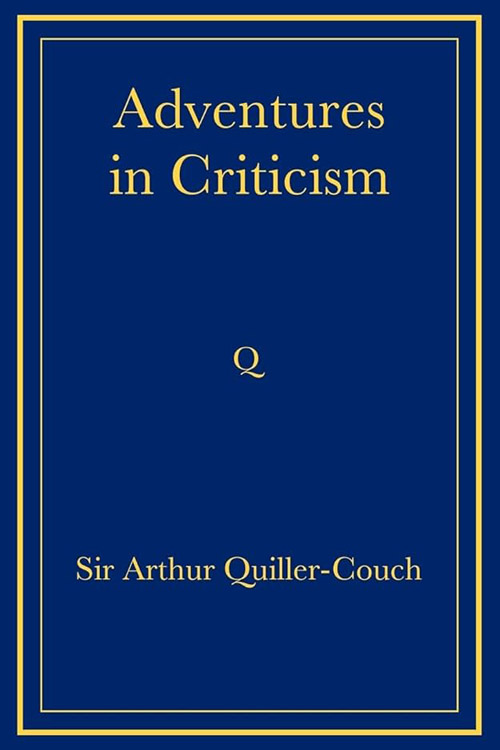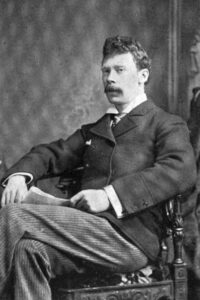
Adventures in Criticism
After twenty-five years of close toil, Professor Skeat completed his superb Chaucer edition. It is easier to be dithyrambic than critical in chronicling this event, to which dithyrambs are more appropriate than criticism. For when a man writes Opus vitæ meæ after such a task as this and so lays down his pen, he must be a churl (even if he is also a competent critic) who will allow no pause for admiration. And where, churl or no churl, is the competent critic to be found? The Professor has here compiled an entirely new text of Chaucer, founded solely on the manuscripts and the earliest printed editions that are accessible. Where Chaucer has translated, the originals have been carefully studied: “the requirements of meter and grammar have been carefully considered throughout”, and “the phonology and spelling of every word have received particular attention.”
All the materials for a Life of Chaucer have been sought out, examined, and pieced together with exemplary care. All this has taken Professor Skeat twenty-five years, and to pass competent judgment on his conclusions, the critic must follow him step by step through his research—which will take the critic (even if we are charitable enough to suppose his mental equipment equal to Professor Skeat’s) another ten years at least. For our time, then, and probably for many generations after, this edition of Chaucer will be accepted as final. And I seem to see in this edition of Chaucer the beginning of the realization of a dream I have cherished since first I stood within the quadrangle of the Clarendon Press—that fine combination of the factory and the palace. The aspect of the Press itself repeats, as it were, the characteristics of its government, which is conducted by an elected body as an honourable trust. Its delegates are not only intent on getting money. Yet, the Clarendon Press makes money, and the University can depend upon it for handsome subsidies. It may well depend upon it for much more.
As the Bank of England—to which in its system of government it may be likened—is the focus of all the other banks, private or joint-stock, in the kingdom, and the treasure-house, not only of the nation’s gold but of its commercial honour, so the Clarendon Press—traditionally careful…
Read or download Book
Arthur Thomas Quiller-Couch
Arthur Quiller-Couch was born in the town of Bodmin, Cornwall, England.
Biography
He was the son of Dr Thomas Quiller Couch (d. 1884), a noted physician, folklorist, and historian who married Mary Ford and lived at 63 Fore Street, Bodmin until he died in 1884. Thomas was the product of the union of two ancient local families, the Quiller and Couch families. Arthur was the third in a line of intellectuals from the Couch family. His grandfather, Jonathan Couch, was a naturalist, physician, historian, classicist, apothecary, and illustrator (particularly of fish). His younger sisters, Florence Mabel and Lilian M., were writers and folklorists.
Arthur Quiller-Couch had two children. His son, Bevil Brian Quiller-Couch, was a war hero and poet, whose romantic letters to his fiancée, May Wedderburn Cannan, were published in Tears of War. Kenneth Grahame inscribed a first edition of his The Wind in the Willows to Arthur’s daughter, Foy Felicia, attributing Quiller-Couch as the inspiration for the character Ratty. Quiller-Couch was educated at Newton Abbot Proprietary College between the late 1870s and early 1880s. Thereafter, he also attended Clifton College, and Trinity College, Oxford, where he took a First in Classical Moderations (1884) and a Second in Greats (1886). From 1886, Quiller-Couch worked for a brief time as a Classics lecturer at Trinity.
After gaining some journalistic experience in London, mainly as a contributor to The Speaker (periodical), he resettled at Fowey in Cornwall during 1891. In Cornwall, he was an active political worker for the Liberal Party. He was knighted in 1910, and in 1928, he was made a bard of the Cornish cultural society, Gorseth Kernow, and adopted the bardic name Marghak Cough (‘Red Knight’). He was Commodore of the Royal Fowey Yacht Club from 1911 until his death. He was the Village Drama Society president based at Kelly House in Devon. Quiller-Couch died at home in May 1944 after being slightly injured by a jeep near his home in Cornwall in the preceding March during his daily walk to the Royal Fowey Yacht Club.






